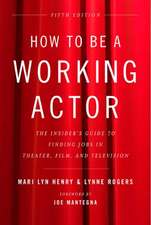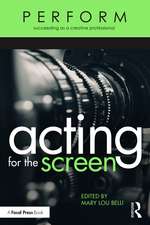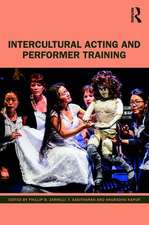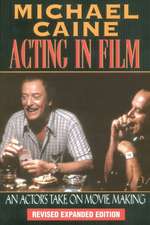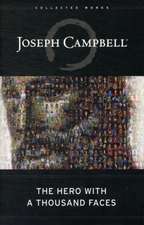The Intent to Live: Achieving Your True Potential as an Actor
Autor Larry Mossen Limba Engleză Paperback – 30 noi 2005
–Larry Moss, from the Introduction
When Oscar-winning actors Helen Hunt and Hilary Swank accepted their Academy Awards, each credited Larry Moss’s guidance as key to their career-making performances. There is a two-year waiting list for his advanced acting classes. But now everyone–professionals and amateurs alike–can discover Moss’s passionate, in-depth teaching.
Inviting you to join him in the classroom and onstage, Moss shares the techniques he has developed over thirty years to help actors set their emotions, imagination, and behavior on fire, showing how the hard work of preparation pays off in performances that are spontaneous, fresh, and authentic.
From the foundations of script analysis to the nuances of physicalization and sensory work, here are the case studies, exercises, and insights that enable you to connect personally with a script, develop your character from the inside out, overcome fear and inhibition, and master the technical skills required for success in the theater, television, and movies.
Far more than a handbook, The Intent to Live is the personal credo of a master teacher. Moss’s respect for actors and love of the actor’s craft enliven every page, together with examples from a wealth of plays and films, both current and classic, and vivid appreciations of great performances. Whether you act for a living or simply want a deeper understanding of acting greatness, The Intent to Live will move, instruct, and inspire you.
From the Hardcover edition.
Preț: 90.57 lei
Preț vechi: 98.53 lei
-8% Nou
Puncte Express: 136
Preț estimativ în valută:
17.33€ • 18.07$ • 14.41£
17.33€ • 18.07$ • 14.41£
Carte disponibilă
Livrare economică 27 februarie-06 martie
Livrare express 13-19 februarie pentru 33.27 lei
Preluare comenzi: 021 569.72.76
Specificații
ISBN-13: 9780553381207
ISBN-10: 0553381202
Pagini: 358
Dimensiuni: 156 x 234 x 19 mm
Greutate: 0.37 kg
Editura: Bantam Books
ISBN-10: 0553381202
Pagini: 358
Dimensiuni: 156 x 234 x 19 mm
Greutate: 0.37 kg
Editura: Bantam Books
Recenzii
“I love the work I’ve gotten to do with Larry. He loves actors, he loves acting, and I love him.”
–Helen Hunt
“Larry Moss is probably the most knowledgeable, articulate, creative, compassionate teacher of acting in America today. He is solely responsible for transforming me from a talented person into an artist.”
–Jason Alexander
“Larry has an uncompromising dedication to the art and craft of acting. I wouldn’t take on another role without working with him.”
–Hilary Swank
“Larry is pure genius. He opened my heart and allowed me to feel again. I would not have been able to be John Coffey without him.”
–Michael Clarke Duncan
From the Hardcover edition.
–Helen Hunt
“Larry Moss is probably the most knowledgeable, articulate, creative, compassionate teacher of acting in America today. He is solely responsible for transforming me from a talented person into an artist.”
–Jason Alexander
“Larry has an uncompromising dedication to the art and craft of acting. I wouldn’t take on another role without working with him.”
–Hilary Swank
“Larry is pure genius. He opened my heart and allowed me to feel again. I would not have been able to be John Coffey without him.”
–Michael Clarke Duncan
From the Hardcover edition.
Notă biografică
Larry Moss studied his craft with such luminaries as Stella Adler, Sanford Meisner, and Warren Robertson. He began his career at New York’s famed cabaret Upstairs at the Downstairs and went on to appear on Broadway in numerous productions. After teaching at Juilliard and Circle in the Square, Moss returned to Los Angeles and founded the Larry Moss Studio in 1990. His directing credits include the off-Broadway hit The Syringa Tree, which won the 2001 Obie for Best Play of the Year, and a new play opening on Broadway in spring 2005.
From the Hardcover edition.
From the Hardcover edition.
Extras
1
Given Circumstances:
Building from the Ground Up
Eighteen years ago I was invited to a dinner that was given expressly to introduce me to the legendary acting teacher Stella Adler. It was a small, elegant gathering of eight at which everyone was dressed up, no one more than Stella, who appeared in a floor-length red gown with jewels adorning the famous Stella Adler cleavage. I'd already studied script analysis with Ms. Adler for three years. But since her lecture classes included seventy-five or more people and Ms. Adler did all the talking, I knew she probably wouldn't remember me.
Except for size, the dinner party was not dissimilar to the lecture course, and I once again said nothing. As Stella discoursed on George Bernard Shaw and Henrik Ibsen, everyone at the party, many of whom were as famous as she, hung on her every word. I was seated at Ms. Adler's right. When we finished our entree, she suddenly turned to me and asked imperiously, "What do you do, young man?" "Well," I said, "I'm an acting teacher, Stella." Her eyes blazed for a moment and then she said, challengingly, "And what do you teach?" And I said, almost shyly, "I was in your script analysis class for three years and I'm hoping to carry on some of the traditions and techniques that I learned from you." Stella impulsively and startlingly grabbed my hand, stared me straight in the eye, and passionately blurted out, "Don't let it die! I beg of you, please pass these ideas on." Then she put her head down and began to weep. At which point everyone else at the table, including me, also began to weep. So there we were, eight theater people with our heads in what remained of our chicken dinners, gurgling and gasping at how much our love for the art of acting meant to each of us and what we wanted it to mean for the next generation. This book is part of my keeping this promise to her.
I'm going to teach you acting from the beginning, and the beginning is script analysis.
In a way, the technique of script analysis is comparable to the process a detective uses to solve a mystery. Just as the detective learns to examine and understand the lives of the people involved in his case (their backgrounds, their relationships, their behaviors, their motives), you will use the technique I'm teaching you to examine and understand the lives of your character and the other characters in a script and see them as real people with real lives, and in so doing you will begin to discover the overall dynamic of that play or film. You'll be able to define precisely what drives your character, the other characters, and the story.
If this sounds like an intellectual exercise, I want to assure you that nothing in this book is simply an intellectual exercise. Everything I'm teaching you about acting has one aim only: to fire you up emotionally and behaviorally so that you can give a vivid, involving, and memorable performance. So when I talk to you about using your mind, ultimately it's to use your mind to carbonate your emotions and imagination. You know how soda is carbonated? It's not just flat in the glass; it's filled with bubbles rising, bumping into each other, bursting, alive. That's the point of everything I'm teaching you--to make you not act but live.
Given circumstances is the term used in acting for everything the writer tells you in the script about your character and the situation they find themselves in. Given circumstances are the facts; they are the information that is not subject to debate. In other words, given circumstances are irrefutable. They are the ground on which you build your creative choices, the only place you can begin. Later, we'll talk about your interpretation of a role, but the facts are the facts and you cannot afford to overlook them.
I know this sounds obvious, but I've seen actors forget that the character they are playing has been written to have a cold, or is entering from a snowstorm, or has just found out that his mother has a fatal disease--the kind of given circumstance that should color how you play a scene from the moment of your entrance.
To the extent that a character's actions toward and reactions to other characters are specified in the script, they are also part of the given circumstances. Anything the script tells you about who your character is or about what the character has done before the story starts is part of the character's given circumstances.
That's why it's so important to read the text. And read it again, until nothing in the script is vague to you. I've heard some actors say, "Well, I didn't even read the whole screenplay, I just read the scenes I'm in." I think that's irresponsible and arrogant, because the given circumstances are so integral to the work that you can't give a full performance without including them.
I'm going to give you several examples of given circumstances to make the idea clear to you and I'm going to begin with the given circumstances of one of history's greatest plays, Hamlet. At the beginning of the play, Shakespeare tells you that Hamlet's father is dead and that Hamlet has come home to Denmark to mourn and to be with his mother, Gertrude, who has quickly, and shockingly, married his dead father's brother, Claudius. In the last scene of Act I, Hamlet is told by his father's ghost that Claudius has murdered him and the ghost asks Hamlet to avenge his death. Through the ghost, Hamlet learns that his mother is complicit with his evil uncle, but whether she knew about the murder or simply lusted indecently for Claudius seems open to interpretation, and this ambiguity creates more torment for Hamlet. The ghost also tells Hamlet that while Hamlet must take revenge on Claudius, he should leave Gertrude to heaven and her own inner turmoil. If you're playing Hamlet, the fact of your father's death, why you have returned, and the ghost's visit, as well as the information the ghost imparts, are not subject to debate. Hamlet's father is not just possibly dead, nor did Hamlet return to Denmark because he wants to marry his girlfriend, Ophelia, or celebrate the hasty wedding of his mother and uncle. His father's death, Hamlet's grief, the ghost's appearance and demand for revenge against Claudius, and Gertrude's unseemly lack of mourning are the absolutes; they are the given circumstances.
Taken all together, the given circumstances--the facts that the writer gives you--are the foundation of the performance; what you add to that foundation is your specific interpretation. Will you choose to make Hamlet an angry, aggressive character, a muted, tormented, self-hating character--or both? The text Shakespeare gives you allows for these and other interpretations. That is the actor's job: to interpret. But you cannot change the basic facts of the script, and if you ignore these facts your performance will begin to fall apart and the play or film will not make any sense.
A couple of years ago in my class, two young actors were presenting one of the final scenes from Anton Chekhov's play The Seagull. In the scene, the young writer, Treplyev, begs Nina, an actress whom he's long loved unrequitedly, to make him part of her life. She rejects him cruelly by expressing her passionate love for another man, Trigorin, a more successful writer whom Treplyev envies. At this point, the actor playing the tormented Treplyev started to beat the actress playing Nina and throw her about the room. The startled young actress began to speed through her final monologue so that she could escape with her life, after which Treplyev, as the script demands, burned every piece of his writing, put a gun to his head, and ended his life.
In my critique, I asked the actor where he found the evidence in the text to support his choice to be physically aggressive toward Nina right before he blows his brains out. The actor's intriguing answer: "I'm so tired of seeing Treplyev played like a victim. I wanted to give the play new life."
I suggested to the actor that, in fact, he had killed the play by refusing to accept the character's given circumstances. At that point in the play, Chekhov never gives Treplyev any lines to express his rage over his great loss of love. The tidal wave of feelings within Treplyev remains choked back. In addition, Nina is written in such a way that she is insensitive to the intensity of Treplyev's pain. If Treplyev were to express his rage physically toward her, she would have to comment on it, and there are no lines that allow her to do that. All Treplyev reveals in this scene is vulnerable love, need, and helplessness. If he could so easily lash out physically at Nina and be so direct with his anger, maybe he wouldn't have to tear up everything he's written and put that gun to his temple.
As Chekhov wrote the part, Treplyev is a victim. He is a victim of his mother's narcissistic indifference, which has left him with a feeling of worthlessness. This is a given circumstance. It is why he chooses Nina, who is a duplicate of his mother in that she, too, cannot truly see or value him. It is the intolerable feeling of being invisible to those whom he needs to love him that causes Treplyev to self-destruct. The young actor in my class was making an effort to be creative in his choices and, perhaps, something in him needed to communicate this anger, but it was totally inappropriate and harmful to the scene. His desire to be creative and to express himself blinded him to the needs of the play.
Let me add that Chekhov does give Treplyev a chance to be aggressive toward Nina when she first rejects him at the play's beginning, but as Treplyev grows older, he grows more internal and more repressed and depressed. In order to play Treplyev successfully, you must understand the given circumstances, which come out of the depth of Chekhov's understanding of human psychology. Chekhov understood that Treplyev's suicidal depression is his anger turned inward. As an actor playing Treplyev, you need to understand Treplyev's behavior, his interactions with Nina, and his point of view on life as it is expressed very specifically in the text.
Chekhov makes it clear from the start of the play that Treplyev sees the world as a frustrating, cheating, unloving place, and that his only hope for happiness is to be respected as a playwright and loved as a man by Nina, dreams that are painfully eluding him. Look at how many facts about Treplyev's given circumstances are given in his dialogue in the first scene in which he appears. He tells his uncle, Sorin, "My mother doesn't love me. Why should she? She wants excitement, romance, and pretty clothes. I'm twenty-five now. That reminds her she's no longer young. When I'm not around she's thirty-two, when I am she's forty-three. She hates me for that." In that line alone, Chekhov establishes the context from which Treplyev views life: he is an unloved son who feels that his mother wishes him out of existence.
And Treplyev goes on to detail his humiliations and defeats: "Maybe I'm selfish, but I wish she weren't a famous actress. Can you imagine what life is like with her, Uncle--the house always full of famous actors and writers? Can you imagine how I feel? The only nobody there is me." His mother, who is clearly comfortably off, has refused to support him. "I left university my third year," Treplyev says, "due to circumstances, as they say, beyond my control. I haven't a kopeck." He feels socially inferior: "According to my passport, I'm a 'bourgeois of Kiev.' That's my social position. My father was a 'bourgeois of Kiev,' too, but he was a famous actor." Treplyev's father--whom we learn is dead--overcame his middle-class position through his talent for acting, but Treplyev says he has "no talent." Later Treplyev says, "When my mother's famous actor, writer and musician friends deign to notice me, I feel them measuring my insignificance. I imagine their thoughts. It's humiliating." In just a few short lines, Chekhov tells us almost everything we need to know about Treplyev's point of view.
I've heard that John Malkovich has said if he understands his character's point of view of the world, it gives him a great clue about how to play all the scenes. Sometimes, as with Treplyev, a character's point of view is given to you clearly in the script, other times you have to glean it from the facts that the script gives you. You have to study the text very diligently until you can say, based on what the script tells you about the character's history, how the character is treated by others, the character's reactions to that treatment, and what the character actually does--not just what they say but what they do--that the character sees the world in a certain way. In this way, your character's point of view is part of, and inextricably tied to, their given circumstances.
In James Brooks's film As Good as It Gets, it is a given circumstance that Melvin Udall (Jack Nicholson) has obsessive-compulsive disorder and sees his life exclusively through that lens. This is not my psychoanalysis of Melvin, it is a fact that is spelled out vividly, and often hilariously, in the script. The first time we see Melvin, he is anxiously walking on the street toward his favorite restaurant, desperately trying not to touch or be touched by anyone he passes (saying to people who walk by, "Don't touch! Don't touch!"). He is also trying to avoid stepping on cracks in the sidewalk. At the restaurant he impatiently waits for the exact table and the exact waitress--Carol Connelly (Helen Hunt)--that he always has. He accosts the people sitting at the table he wants and talks at them about their having big noses and being Jewish until they are so affronted that they flee. So the given circumstances of the scene are that he is an obsessive-compulsive middle-aged man who comes to the restaurant where he wants his particular table and his particular waitress, someone else is at his table and he needs to have everything in harmony with his compulsions in order to feel safe and not become hysterical with terror. Part of his behavior, because of his disorder, is that he will insult anyone about anything if he's frustrated or frightened.
The given circumstances for Carol are that she's a single mother working as a waitress, whose entire life is devoted to taking care of her dangerously asthmatic son. She has no other priority, no other life. She has waited on Melvin many times before, and she knows him. In that opening scene, Carol warns Melvin to behave and at the same time protects him from the glowering restaurant manager, who wants to throw him out.
From the Hardcover edition.
Given Circumstances:
Building from the Ground Up
Eighteen years ago I was invited to a dinner that was given expressly to introduce me to the legendary acting teacher Stella Adler. It was a small, elegant gathering of eight at which everyone was dressed up, no one more than Stella, who appeared in a floor-length red gown with jewels adorning the famous Stella Adler cleavage. I'd already studied script analysis with Ms. Adler for three years. But since her lecture classes included seventy-five or more people and Ms. Adler did all the talking, I knew she probably wouldn't remember me.
Except for size, the dinner party was not dissimilar to the lecture course, and I once again said nothing. As Stella discoursed on George Bernard Shaw and Henrik Ibsen, everyone at the party, many of whom were as famous as she, hung on her every word. I was seated at Ms. Adler's right. When we finished our entree, she suddenly turned to me and asked imperiously, "What do you do, young man?" "Well," I said, "I'm an acting teacher, Stella." Her eyes blazed for a moment and then she said, challengingly, "And what do you teach?" And I said, almost shyly, "I was in your script analysis class for three years and I'm hoping to carry on some of the traditions and techniques that I learned from you." Stella impulsively and startlingly grabbed my hand, stared me straight in the eye, and passionately blurted out, "Don't let it die! I beg of you, please pass these ideas on." Then she put her head down and began to weep. At which point everyone else at the table, including me, also began to weep. So there we were, eight theater people with our heads in what remained of our chicken dinners, gurgling and gasping at how much our love for the art of acting meant to each of us and what we wanted it to mean for the next generation. This book is part of my keeping this promise to her.
I'm going to teach you acting from the beginning, and the beginning is script analysis.
In a way, the technique of script analysis is comparable to the process a detective uses to solve a mystery. Just as the detective learns to examine and understand the lives of the people involved in his case (their backgrounds, their relationships, their behaviors, their motives), you will use the technique I'm teaching you to examine and understand the lives of your character and the other characters in a script and see them as real people with real lives, and in so doing you will begin to discover the overall dynamic of that play or film. You'll be able to define precisely what drives your character, the other characters, and the story.
If this sounds like an intellectual exercise, I want to assure you that nothing in this book is simply an intellectual exercise. Everything I'm teaching you about acting has one aim only: to fire you up emotionally and behaviorally so that you can give a vivid, involving, and memorable performance. So when I talk to you about using your mind, ultimately it's to use your mind to carbonate your emotions and imagination. You know how soda is carbonated? It's not just flat in the glass; it's filled with bubbles rising, bumping into each other, bursting, alive. That's the point of everything I'm teaching you--to make you not act but live.
Given circumstances is the term used in acting for everything the writer tells you in the script about your character and the situation they find themselves in. Given circumstances are the facts; they are the information that is not subject to debate. In other words, given circumstances are irrefutable. They are the ground on which you build your creative choices, the only place you can begin. Later, we'll talk about your interpretation of a role, but the facts are the facts and you cannot afford to overlook them.
I know this sounds obvious, but I've seen actors forget that the character they are playing has been written to have a cold, or is entering from a snowstorm, or has just found out that his mother has a fatal disease--the kind of given circumstance that should color how you play a scene from the moment of your entrance.
To the extent that a character's actions toward and reactions to other characters are specified in the script, they are also part of the given circumstances. Anything the script tells you about who your character is or about what the character has done before the story starts is part of the character's given circumstances.
That's why it's so important to read the text. And read it again, until nothing in the script is vague to you. I've heard some actors say, "Well, I didn't even read the whole screenplay, I just read the scenes I'm in." I think that's irresponsible and arrogant, because the given circumstances are so integral to the work that you can't give a full performance without including them.
I'm going to give you several examples of given circumstances to make the idea clear to you and I'm going to begin with the given circumstances of one of history's greatest plays, Hamlet. At the beginning of the play, Shakespeare tells you that Hamlet's father is dead and that Hamlet has come home to Denmark to mourn and to be with his mother, Gertrude, who has quickly, and shockingly, married his dead father's brother, Claudius. In the last scene of Act I, Hamlet is told by his father's ghost that Claudius has murdered him and the ghost asks Hamlet to avenge his death. Through the ghost, Hamlet learns that his mother is complicit with his evil uncle, but whether she knew about the murder or simply lusted indecently for Claudius seems open to interpretation, and this ambiguity creates more torment for Hamlet. The ghost also tells Hamlet that while Hamlet must take revenge on Claudius, he should leave Gertrude to heaven and her own inner turmoil. If you're playing Hamlet, the fact of your father's death, why you have returned, and the ghost's visit, as well as the information the ghost imparts, are not subject to debate. Hamlet's father is not just possibly dead, nor did Hamlet return to Denmark because he wants to marry his girlfriend, Ophelia, or celebrate the hasty wedding of his mother and uncle. His father's death, Hamlet's grief, the ghost's appearance and demand for revenge against Claudius, and Gertrude's unseemly lack of mourning are the absolutes; they are the given circumstances.
Taken all together, the given circumstances--the facts that the writer gives you--are the foundation of the performance; what you add to that foundation is your specific interpretation. Will you choose to make Hamlet an angry, aggressive character, a muted, tormented, self-hating character--or both? The text Shakespeare gives you allows for these and other interpretations. That is the actor's job: to interpret. But you cannot change the basic facts of the script, and if you ignore these facts your performance will begin to fall apart and the play or film will not make any sense.
A couple of years ago in my class, two young actors were presenting one of the final scenes from Anton Chekhov's play The Seagull. In the scene, the young writer, Treplyev, begs Nina, an actress whom he's long loved unrequitedly, to make him part of her life. She rejects him cruelly by expressing her passionate love for another man, Trigorin, a more successful writer whom Treplyev envies. At this point, the actor playing the tormented Treplyev started to beat the actress playing Nina and throw her about the room. The startled young actress began to speed through her final monologue so that she could escape with her life, after which Treplyev, as the script demands, burned every piece of his writing, put a gun to his head, and ended his life.
In my critique, I asked the actor where he found the evidence in the text to support his choice to be physically aggressive toward Nina right before he blows his brains out. The actor's intriguing answer: "I'm so tired of seeing Treplyev played like a victim. I wanted to give the play new life."
I suggested to the actor that, in fact, he had killed the play by refusing to accept the character's given circumstances. At that point in the play, Chekhov never gives Treplyev any lines to express his rage over his great loss of love. The tidal wave of feelings within Treplyev remains choked back. In addition, Nina is written in such a way that she is insensitive to the intensity of Treplyev's pain. If Treplyev were to express his rage physically toward her, she would have to comment on it, and there are no lines that allow her to do that. All Treplyev reveals in this scene is vulnerable love, need, and helplessness. If he could so easily lash out physically at Nina and be so direct with his anger, maybe he wouldn't have to tear up everything he's written and put that gun to his temple.
As Chekhov wrote the part, Treplyev is a victim. He is a victim of his mother's narcissistic indifference, which has left him with a feeling of worthlessness. This is a given circumstance. It is why he chooses Nina, who is a duplicate of his mother in that she, too, cannot truly see or value him. It is the intolerable feeling of being invisible to those whom he needs to love him that causes Treplyev to self-destruct. The young actor in my class was making an effort to be creative in his choices and, perhaps, something in him needed to communicate this anger, but it was totally inappropriate and harmful to the scene. His desire to be creative and to express himself blinded him to the needs of the play.
Let me add that Chekhov does give Treplyev a chance to be aggressive toward Nina when she first rejects him at the play's beginning, but as Treplyev grows older, he grows more internal and more repressed and depressed. In order to play Treplyev successfully, you must understand the given circumstances, which come out of the depth of Chekhov's understanding of human psychology. Chekhov understood that Treplyev's suicidal depression is his anger turned inward. As an actor playing Treplyev, you need to understand Treplyev's behavior, his interactions with Nina, and his point of view on life as it is expressed very specifically in the text.
Chekhov makes it clear from the start of the play that Treplyev sees the world as a frustrating, cheating, unloving place, and that his only hope for happiness is to be respected as a playwright and loved as a man by Nina, dreams that are painfully eluding him. Look at how many facts about Treplyev's given circumstances are given in his dialogue in the first scene in which he appears. He tells his uncle, Sorin, "My mother doesn't love me. Why should she? She wants excitement, romance, and pretty clothes. I'm twenty-five now. That reminds her she's no longer young. When I'm not around she's thirty-two, when I am she's forty-three. She hates me for that." In that line alone, Chekhov establishes the context from which Treplyev views life: he is an unloved son who feels that his mother wishes him out of existence.
And Treplyev goes on to detail his humiliations and defeats: "Maybe I'm selfish, but I wish she weren't a famous actress. Can you imagine what life is like with her, Uncle--the house always full of famous actors and writers? Can you imagine how I feel? The only nobody there is me." His mother, who is clearly comfortably off, has refused to support him. "I left university my third year," Treplyev says, "due to circumstances, as they say, beyond my control. I haven't a kopeck." He feels socially inferior: "According to my passport, I'm a 'bourgeois of Kiev.' That's my social position. My father was a 'bourgeois of Kiev,' too, but he was a famous actor." Treplyev's father--whom we learn is dead--overcame his middle-class position through his talent for acting, but Treplyev says he has "no talent." Later Treplyev says, "When my mother's famous actor, writer and musician friends deign to notice me, I feel them measuring my insignificance. I imagine their thoughts. It's humiliating." In just a few short lines, Chekhov tells us almost everything we need to know about Treplyev's point of view.
I've heard that John Malkovich has said if he understands his character's point of view of the world, it gives him a great clue about how to play all the scenes. Sometimes, as with Treplyev, a character's point of view is given to you clearly in the script, other times you have to glean it from the facts that the script gives you. You have to study the text very diligently until you can say, based on what the script tells you about the character's history, how the character is treated by others, the character's reactions to that treatment, and what the character actually does--not just what they say but what they do--that the character sees the world in a certain way. In this way, your character's point of view is part of, and inextricably tied to, their given circumstances.
In James Brooks's film As Good as It Gets, it is a given circumstance that Melvin Udall (Jack Nicholson) has obsessive-compulsive disorder and sees his life exclusively through that lens. This is not my psychoanalysis of Melvin, it is a fact that is spelled out vividly, and often hilariously, in the script. The first time we see Melvin, he is anxiously walking on the street toward his favorite restaurant, desperately trying not to touch or be touched by anyone he passes (saying to people who walk by, "Don't touch! Don't touch!"). He is also trying to avoid stepping on cracks in the sidewalk. At the restaurant he impatiently waits for the exact table and the exact waitress--Carol Connelly (Helen Hunt)--that he always has. He accosts the people sitting at the table he wants and talks at them about their having big noses and being Jewish until they are so affronted that they flee. So the given circumstances of the scene are that he is an obsessive-compulsive middle-aged man who comes to the restaurant where he wants his particular table and his particular waitress, someone else is at his table and he needs to have everything in harmony with his compulsions in order to feel safe and not become hysterical with terror. Part of his behavior, because of his disorder, is that he will insult anyone about anything if he's frustrated or frightened.
The given circumstances for Carol are that she's a single mother working as a waitress, whose entire life is devoted to taking care of her dangerously asthmatic son. She has no other priority, no other life. She has waited on Melvin many times before, and she knows him. In that opening scene, Carol warns Melvin to behave and at the same time protects him from the glowering restaurant manager, who wants to throw him out.
From the Hardcover edition.













